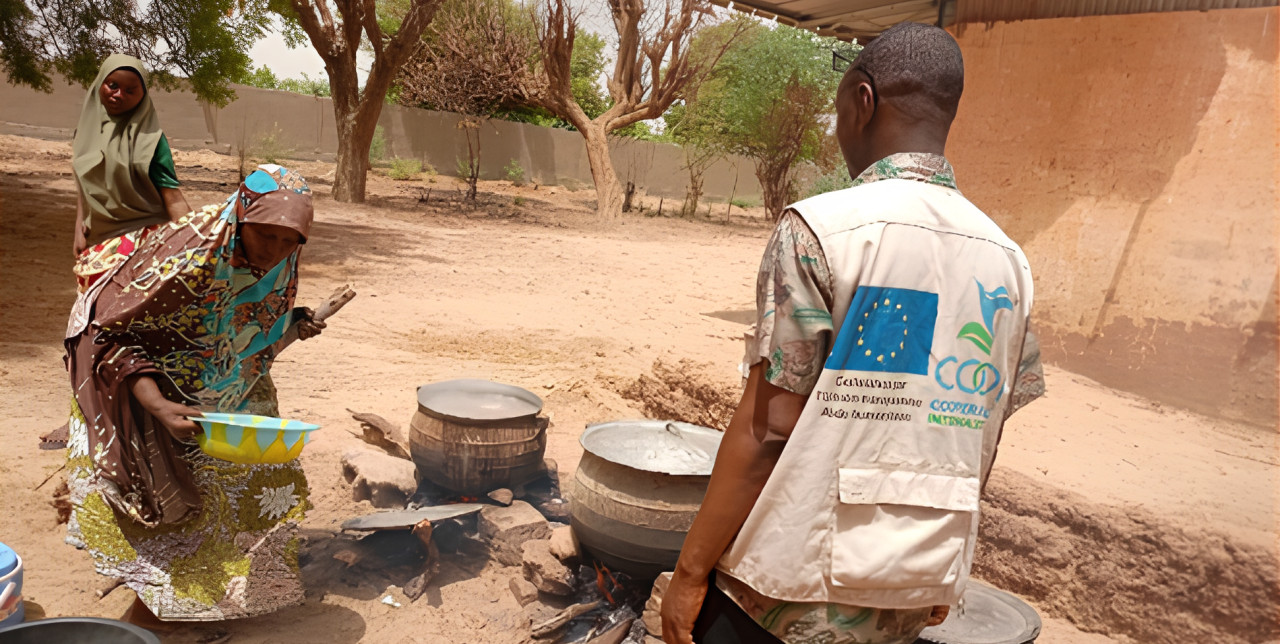31-12-2024 | di COOPI
Niger. How school canteens are transforming the Tahoua region
In 2023, COOPI - Cooperazione Internazionale implemented the ECHO-funded project ‘Facilitating the integration of children and adolescents affected by the humanitarian crisis into a safe and protective education system in Niger’ in the districts of Takanamat, Sabon Guida, Bangui, Azarori and Galma in the Tahoua region. This project demonstrated how a targeted intervention can transform the living conditions of entire communities by focusing on the educational and nutritional needs of children.
A significant example of the impact of this initiative is the story of Mafida Mamane, a 10-year-old refugee girl in Niger from Nigeria. Mafida attends the Bangui Centre school and, before the introduction of school canteens, her family's financial difficulties did not allow her to receive regular meals, often forcing her to drop out of school. Thanks to the COOPI project, Mafida now receives nutritious meals daily, has improved her school attendance and stands out for her commitment to study.
Every day I come to school with joy, knowing that I can eat and learn. This has changed my life,’
says Mafida with a smile.
The Tahoua region, located on the border with Mali, is deeply marked by an acute humanitarian crisis, fuelled by armed violence, community tensions and socio-economic fragility. Since 2017, instability has had a dramatic impact on education: 6 per cent of schools accommodating displaced students or refugees have been temporarily closed, while 60 per cent have seen an increase in school dropouts. In addition, 46% of schools lack access to drinking water and open defecation is a widespread practice, further compromising educational conditions.
In this context, the COOPI project adopted an innovative and inclusive approach, based on the direct transfer of funds to the Decentralised School Management Committees (CGDES), allowing them to manage school canteens themselves. This model reached 10,345 students, guaranteeing nutritious meals adapted to local needs, promoting community participation and strengthening their economic autonomy.
The school canteens have had a positive impact not only on nutrition, but also on school attendance, particularly among girls, facilitating the reintegration of many children who had dropped out of school. In addition to improving educational conditions, the project has alleviated the economic burden on the most vulnerable families, creating an environment conducive to learning.
The initiative was implemented in cooperation with the educational and local authorities, who played a crucial role in supervising the CGDES and monitoring the transferred funds. This synergy ensured transparent and effective management, promoting a safe and stimulating school environment for the children.
Mafida Mamane's story is a tangible example of how COOPI's project is transforming the future of children in the Tahoua region. Not only has Mafida gained access to continuous education, but she has also regained hope and confidence in tomorrow. The programme does not just provide food assistance: it promotes social inclusion and empowerment of local communities, demonstrating that investing in education is a key step in building resilience and opportunity in crisis contexts.
COOPI has been working in Niger since 2012 developing integrated multi-sector intervention programmes, responding to various humanitarian crises. Today we intervene with 23 projects in the areas of nutrition, food security, emergency education, psychosocial support, mental health, protection, disaster risk reduction and preparedness, and entrepreneurial development.




 Niger
Niger